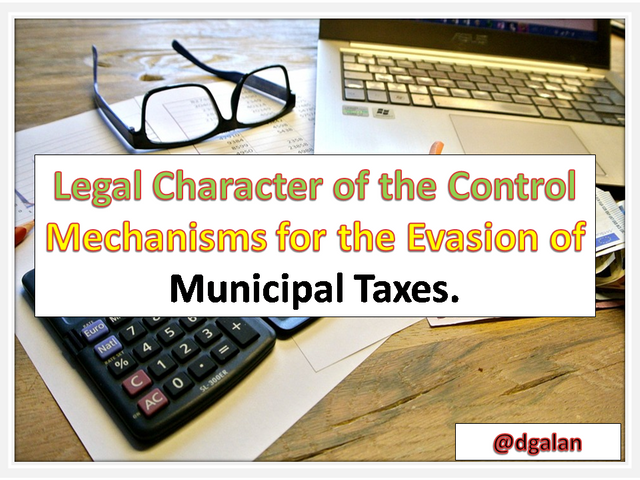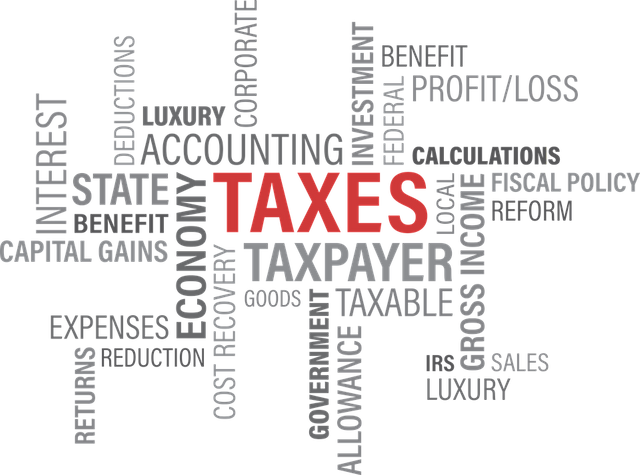Written by:Diomer Antonio Galán Rincón.
Bachelor's Degree.Public Accounting / MSc.Science of Higher Education.

Author: @dgalan,through Power Point 2010 tool, and using public domain image Pixabay
Every country must implement strategies for an efficient collection of taxes, for this it is necessary to apply control mechanisms for the evasion of such taxes, which will allow the state to obtain greater income and thus satisfy the innumerable needs of the population, with the purpose of contributing to the social and economic development of their nation, since they constitute the most important source of modern states.
It should be noted that the states make their income projections through the collection of taxes, as well as apply coercion, exercising their power to require natural and legal persons within their jurisdiction to collect them, depending on the tax system of each country and its rules and laws.
It is important to mention that tax evasion is a reality that concerns all countries in the world, for such reason the effects caused by these actions lead to a decrease in income and generate a fiscal deficit and devaluation of private investment.

Image taken from:Pixabay
That is why Asanza Natie (2014) expresses that tax evasion is the total or partial non-compliance by taxpayers, in the declaration and payment of their tax obligations. National taxes in Venezuela are an obligation and the national government and its autonomous entities are in charge of collecting taxes in order to finance the country's public expenditures.
The tax system is based on the principle of legality, which consists in the fact that no taxes or contributions may be established that are not formally provided for by law; it also includes the territorial distribution of public powers, i.e., at the national, state and municipal levels; it is developed by establishing a tax structure of law that regulates the legal tax relationship that arises between the active subject (state) and the passive subject (taxpayer and responsible party).
For its part, the State has the power to create, modify or suppress taxes, since the tax is a fiscal burden imposed on taxpayers, requiring its payment to obtain income and support public For its part, the State has the power to create, modify or suppress taxes, since the tax is a fiscal burden imposed on taxpayers, requiring its payment to obtain income and support public expenditures, with the objective of defraying the needs of the population.
Due to the diversity of taxes and the geographical dimension of Venezuela, in order to collect all taxes, the Constitution of the Bolivarian Republic of Venezuela grants each state and municipality the competence and autonomy to create, collect and invest its own revenues, which is contemplated in Article 168.

Image taken from:Pixabay
Likewise, Article 180 establishes the political, tax and administrative autonomy of the municipalities, where municipal taxes are established in ordinances, and the National Power cannot intervene in these local tax regulations.
Therefore, the municipalities are the ones that create their own ordinances in accordance with the provisions of the Constitution. In order for the public entities to have a good administration, they use as mechanisms an effective internal tax control in order to allow them to comply with the established legal provisions and thus avoid being sanctioned for not complying with the parameters required by law.
I hope you like my article and I would appreciate all your comments.
Hello @dgalan
I have known that evading taxes is a big flaw and very punishable in many countries, I suppose that in Venezuela is similar,however, knowing the Venezuelan reality, I know that there is currently an abuse by the state,because almost every two weeks they increase taxes to private companies.
And finally, it does not have a positive impact on citizens, since corruption is such that there are no real benefits for society.
Downvoting a post can decrease pending rewards and make it less visible. Common reasons:
Submit
Greetings@ josevas217. The tax evasion demonstrated if they have pecuniary consequences and if it is reiterative even criminal, that is enshrined in almost all countries. Taxes are a mechanism for collecting revenue that the state uses to cover its expenses. In Venezuela it is not that taxes are increased every week to private companies, what happens is that the payment is not rewarded in benefits for citizens, and that is a cause of demotivation on the part of the taxpayer.
Thank you very much for your comments.
Downvoting a post can decrease pending rewards and make it less visible. Common reasons:
Submit
We cannot remove tax but we can make it small , the main reason to tax is to give people a good economy and some responsibility towards the society which will help in growth of the society
Downvoting a post can decrease pending rewards and make it less visible. Common reasons:
Submit
Greetings@ adityajainxds. You are very right in your statement. I particularly believe that this will not happen in Venezuela due to the country's situation, since it is one of the sources of financing for the state, to obtain income. However, I think that if taxes are not repaid in works for society, it will increase a tax culture of tax evasion.
Thank you very much for your comments.
Downvoting a post can decrease pending rewards and make it less visible. Common reasons:
Submit
Greetings @dgalan, tax evasion is a very serious issue, because many people although they receive their wealth in the national territory, seek ways to not pay tax, despite being established in a law, and mandatory compliance, it is for them that the evasion of these taxes, are paid with monetary penalties, and very serious cases with imprisonment.
Downvoting a post can decrease pending rewards and make it less visible. Common reasons:
Submit
Greetings @ chucho27. Taxes have existed for many years , and there has always been evasion, However the laws have been modified to try to close all those loopholes that have existed and by which taxpayers legally use to evade taxes. An example of this is the taxing power that the Government has granted to the States and Municipalities so that they can create their own taxes that are not in line with the national taxes. At the same time there are laws for those taxpayers who have offshore economic activities, where the laws make it clear where and how to pay their taxes.
Thank you very much for your comments.
Downvoting a post can decrease pending rewards and make it less visible. Common reasons:
Submit